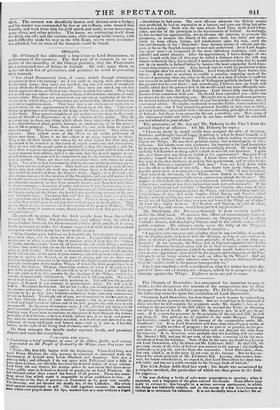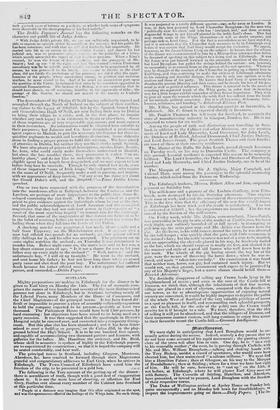The Marquis of Downshire has announced his intention to pay,
in future, to the clergymen the amount of time composition due to them from parishes on his Lordship's property. The Dublin Evening Post has the following remarks upon this resolution of Lord Downshire. "Certainly Lord Downshire has done himself much honour by undertaking the payment of the parsons on his estates. But we would beg to be informed of this—whether he will regulate his payments under Mr. Stanley'a Act, or ac- cording to the principles of the Bill which he assisted the Tories in throwing out of the Hcuse of Lords. if under Mr. Stanley's Act, he will pay 85 per cent. If lie govern his payment by the principles of the rejected Bill, he will pay them 60. But perhaps we do injustice to the noble Marquis. Perhaps his Lordship intends to pay the full amount of the composition under Mr. Goulburn's tee. If so, Lord Downshire will have done himself great credit, at a very Con I lerable sacrifice of property; for we take it :or granted, in the pre- sent state of public opinion, Lord Downshire will not demand the tithe from his tenantry. It is, however, more probable that his Lordship will act under Mr. Stanley's Bill, and pay 8.5 per cent. of the tithe, reserving 15 for the costs of collection from his tenantry. Now, if this be the case, we would beg leave to ask Lord Downshire, why he threw out Mr. Littleton's Bill? By that bill, ft0 per cent. nearly of the tithe of Ireland was secured to the parson ; the landlords undertaking to pay 60, and the State the remainder. Lord Downsides, then, has only added .5, or at the most '74 per cent. to the income. But he has em- braced the whole principle of Mr. Littleton's Bill. Leaving this matter, how- ever, for future consideration, we repeat it, that Lord Downshire has done him- self credit, and has set a noble example to the Orange lords of Ireland." The Irish Judge Jebb died last week : his death was occasioned by a singular accident, the particulars of which are thus given in the Dub- lin papers- " He was shaking a bottle of soda-water preparatory to opening ; when it exploded, and a fragment of the glass entered his thumb. Some efforts were made to extract it : this brought on a serious nervous excitement, to which the Judge was habitually subject, and in the course of a few hours became es violent am to terminate his eminence. It is not decidedly stated whether the at
tack partook inure of tetanus or p kralysis, or whether both series of symptoms were observable iu the short progress of his fatal malady."
The Dublin Freeman's Journal has the following remarks on the character and public life of Judge Jebb- " With Judge Jehb's private lift, we ::re not sufficiently acquainted, to be able to express an opinion either favourable or the reverse ; but his public life haa•been notorious, and with that we wil! deal trades:ly, but impartially. Ile started into life as an enemy to th- ioative Cohn, ; and almost his last judicial act, was to pronounce severe ,cub .e.: on the publisher of a letter, which merely advocated the repeal of Lhat t1 4:61,11, IliCaSurc. When a King's counsel, he won the favour of Lord :;,n borv, and the panegyric of Mr. &Min; had ae one of the right t just then wauted'—when Protestant ascendancy was 'to be upheld, and (solidi: ea %etude to be perpetuated by all means, he was promosd to the bensh, saner at JusticeJusce in the chief place, did not falsify the predictions of his patrons; or did it allay the appre. hensious of the people, whose unrelenting enemy, irk political and sectarian warfare, he never ceased to he. And if he acted a i inconsistent part upon the question of the lTnion, he balanced that error by 11:s consistent opposition to universal Emancipation. The brother of a Bishop, it is not surprising that he should have shown, on all occasians, hostility to the opponents of tithe: the protege', of Mr. Saurin, we should not mut vel at his enmity to Catholic freedom."
The descendants of Sir Phelim O'Neill having sufficiently argued and wrangled through the North of Ireland on the subject of their conflict- ing claims to the legacy of '2)0,0t)0/. left by the Spanish Grand Duke and Generalissimo Hugh O'Neill, are now finding their way to Dublin to bring their affairs to a crisis, and, in the first place, to inquire whether any such legacy is in existence in Spain or elsewhere. Some of these inquirers are of very respectable appearance, and most earliest in their researches. No information could be obtained here suitable to their purposes ; but Johnson and Co. have despatched a professional agent express to Madrid, to gain the necessary intelligence for these in- quisitive. aspirants to wealth and hereditary distinction. Some difficulty arose in finding a proper person to fulfil this miesion. We have plenty of attornies in Dublin, but neither they nor their clerks speak Spanish. We have also plenty of priests of all descriptions, monks, friars, Jesuits, &c. here, who could easily make themselves understood in Madrid ; but since the late troubles there, they pronounce it rather " an Un- healthy place," and do not like to undertake the task. However, an eligible agent has at length been despatched, and we may expect to hear before long how be succeeds. Though he only started last week, seine of these impatient "sons of Irish kings," the roil-porters, who rejoice in the name of O'Neill, frequently make a call in passing, and inquire, with an appearance of deep interest, "if any tows has come yet about the- Grand Duke's will, and the 4200,000/. ?"—Times Dublin Corre- spondent.
One or two facts connected with the progress of the investigation into the murderous affair at Ballyeagh between the Cooleess and the Lawlors, are perhaps of more importance to the public than those de- veloped concerning the riot itself. The first is the refusal of a parish priest to give evidence against the individuals whom he saw at the riot. and the public acknowledgment of Lord hemnare acid the assembled magistrates that they bad not sufficient power in their capacity of "a court of the most searching inquiry" to commit. him for the contempt. Second, that some of the magistrates of that district are believed to he in the habit of receiving bribes (in work Or Mu ? 1 y) flora tilt rioters for bailing them when they fall into the bends of the Pave.
A shocking murder was perpetrated last week, about a mile and a
half from Tipperary, on the Mitchelstown road. It ;seas that a man had offered two pounds for an orchard ; misfiles person 01;,red fifty shillings for it, and his offer was accepted. The purchaser sat up some nights watching the orchard ; on Thursday it was determined to murder him. Before night came on, the man's wife said to her son, a boy about sixteen years of age, " Is it not a shame for pm to let your father stay up every night in the orchard ?" " Well, mother," said the unfortunate boy, " I will sit up to-night." He went to the orchard, and sent home his father; he had not been long there wi .!! an armed party came and shot dead the poor boy. The unfortunate lad suffered death because his fattier offered more for u few apples than another person, and succeeded.—Dublin Paper.

















 Previous page
Previous page